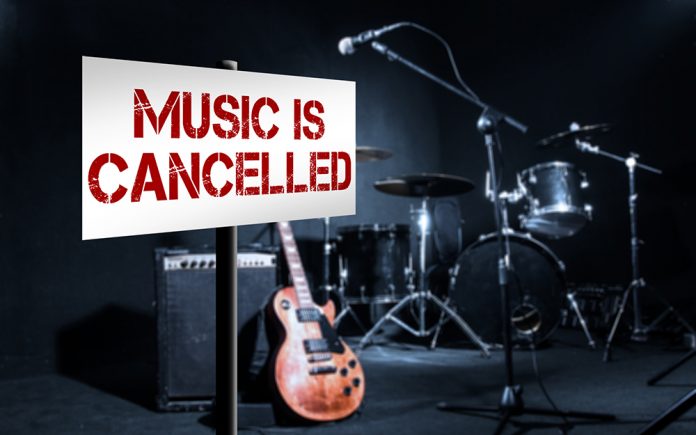
By Noe Gutierrez
These last few weeks have seen the Coachella Valley and High Desert go from an invigorated and bustling resort community enjoying the nightlife and live music that only “the season” can bring to an almost complete shut-down and quarantine. The pandemic that is COVID-19 has compelled the world to figuratively pause on its axis as well as necessitate us to reconsider our priorities, stripping us of our willful ability to provide for our families and enjoy our lives as we knew them. Musicians around the globe have been especially hit hard. In California, already having concern over CA Assembly Bill 5 aka “gig worker bill” a law that reclassifies “non-union professional musicians” as employees and would effectively require anyone wanting to hire them to pay employment taxes and provide benefits like worker’s compensation and overtime, musicians are looking to navigate the waters of the unforeseeable future with the additional stressor of the Coronavirus and its after-effects.
“The Day the Music Died” was supposed to have occurred on February 3, 1959, with the untimely deaths of Buddy Holly, Ritchie Valens and “The Big Bopper” J. P. Richardson in a plane crash over the skies of Clear Lake, Iowa. With the cancellation of SXSW, the postponement of music festivals like Coachella Valley Music and Arts Festival and Stagecoach Country Music Festival, all the festivities that surround them and the shut-down of all groups of 10 or more, which virtually eliminates all live music events in every venue, it feels as if the music, once again, has died, albeit temporarily.
In the Coachella Valley and High Desert, there are some musicians who depend on their live shows to support themselves and their families and there are those who work “day jobs” in order to support their passion for music and performance. Despite the obvious, continue to “practice” or “rehearse” and work on your craft, how do music professionals support themselves or continue to progress on their chosen path? What do Coachella Valley and High Desert musicians do in the midst of the current situation where they are unable to tour or perform? Some have had to use ingenuity to face an uncertain future with little to no support. Here are some of my suggestions to maneuver through the difficult times so that you as artists can come out of this hardship more resolute and refined.
- Musicians, Stay Connected to Each Other
You have each other. Mutual aid for artists is designed to help those with similar pursuits come together and support one another. You learn that you are not alone. Communicating with one another will also lessen the isolation and frustration you may experience. The reality is, your environment has changed but your attitudes shouldn’t. There are so many avenues of communication now that you can tap into like social media, text, phone, email and real-time meet-ups like Skype, FaceTime and Zoom. There are no excuses, stay connected.
- A Renaissance of Musical Values and Standards
In being urged to remain isolated, this break can also provide an opportunity to rededicate yourself to your craft. Take the time to look at your strengths as an artist and write them down while also determining those deficits that you can work on during this downtime. In the past, I have advised artists to develop a “vision board” or some form of visual aid to help plan their immediate and long-term plans using words and images. When you put your dreams on paper, they take a whole new form. It also holds you accountable.
Independent artists are independent for a reason and we all know that no one person can do it alone. There are others who you can trust to help you fulfill your vision. Maybe this is a good time to find or interview a manager, photographer, graphic artist, stylist, bandmate or maybe even reach out to professionals in your sphere of influence to ask questions about the music industry or business in general. We have an overabundance of individuals in the desert who are ready and willing to support you in your journey with no strings attached. In doing these things, you will raise the bar for yourself, your peers, and those who come after you.
- New Challenges Faced with Determination and Boldness: Increase Your Frustration Tolerance
The current events that are developing on an hourly basis have tested the resolve of the world, the United States, California, the Coachella Valley and our individual character. Challenging times will test your level of Frustration Tolerance. When we are easily frustrated and upset, we are said to have, Low Frustration Tolerance (LFT). If we are less disturbed or upset by short-term frustrations, and persevere through difficulties and withstand stressful events, we are said to have High Frustration Tolerance (HFT). Developing High Frustration Tolerance is essential for good mental health and a key element of Mental Toughness, a trait that allows us to accept responsibility for our thoughts, emotions and behavior.
The delaying of gratification is probably the number one exercise to help develop HFT. This delay has occurred involuntarily for musicians so visualize that point in time when you’ll be able to hit that first note in front of fans, friends and family. You will learn to let go of the frustration the more you anticipate your return.
In coping with the frustration of not being able to perform, you can seek neutrality in “talking to yourself” when negative situations arise like what you’re dealing with now. How you think about what happens determines the emotion you feel and the degree to which you may feel it.
- Take Steps Toward Economic Stability
Produce online shows through Facebook Live, Live on Instagram, YouTube Live, add a virtual tip jar, focus more on sales of digital and physical music and merchandise, create a fan club and set up paid subscriptions, etc. Think outside the lines and be creative and innovative, it’s what you are anyway, why wouldn’t you crossover your creativity and skills into doing things differently? The new streams of revenue you discover can be applied as an adjunct to your live shows once you are able to return to performing.
Reclamation and Recovery of the Desert Music Scene
If anything, these trying times can challenge your resolve and will no doubt produce an enlightened and interesting way of life for all musicians which will open up roads ahead and allow them to achieve higher levels than ever before. There will be a new hope achieved once you get a grasp on things and can respond with your new normal. You will be different and have a new appreciation of the possibilities and your new way of life. This too shall pass.
This is by no means an all-inclusive approach to the dilemma, but the continuing of a conversation that has already begun. Be a part and not apart. We wish everyone only the best!
Noe Gutierrez is the Founder of Desert Music, a music management and production organization whose current roster includes Courtney Chambers, Empty Seat and Arek Religa. He also guides the Desert Music Alliance, a large group of invested individuals that supports all music artists in the Coachella Valley and High Desert.










































